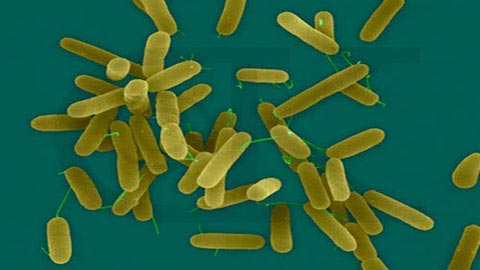Antiseptic - double-edged sword
Using an antiseptic can cause bacteria to become resistant to antibiotics as well as the same antiseptic. This study may be an important suggestion in controlling the spread of infections in hospital settings.

Pseudomonas aeruginosa bacteria under a microscope - Photo: jazzroc.wordpress
Researchers at the National University of Ireland at Galway discovered that when they increased the amount of antiseptic to cultivate Pseudomonas aeruginosa (green pus bacillus) in the laboratory, the bacteria could adapt to survive not only with antiseptic but also with ciprofloxacin, a common antibiotic without any expression.
They proved that bacteria adapted to effectively remove antimicrobials (antiseptics and antibiotics) from bacterial cells. Adaptive bacteria also have DNA alterations, allowing them to resist ciprofloxacin, a specific antibiotic.
P. Aeruginosa is an opportunistic bacterium that can cause widespread infections in patients with weak immune systems and patients with diseases such as cystic fibrosis (CF) and diabetes.
P. Aeruginosa is an important cause of hospital infections. Antiseptic is used to kill surface bacteria to prevent their spread. If the bacteria can still survive and continue to infect patients, people will take antibiotics for treatment.
When bacteria become resistant to both drugs, this will be a dangerous threat to patients at the hospital.
It is important that this study shows that when adding a small amount of antiseptic is not enough to kill cultured bacteria, adaptive bacteria can almost outperform non-adapted bacteria.
Dr. Gerard Fleming, head of the study, said: 'In principle, this means that the excess of improperly diluted antiseptic remains on surfaces at the hospital can promote the development of antibiotic resistant bacteria. More worryingly, it seems that bacteria can adapt to antibiotic resistance without any expression. '
Dr. Fleming also emphasized the importance of studying environmental factors that can promote drug resistance.
'We need to study the effects of using more antiseptics in promoting antibiotic resistance. This will first increase the effectiveness of antiseptic treatment and antibiotics, against hospital infections'.
- Antioxidant is a double-edged sword
- Network security: More and more passwords are more dangerous
- Eye drops - double-edged sword
- Computer control software is a double-edged sword
- These are the swords that have
- Pain reliever Aspirin - a double-edged sword for cancer prevention
- Why can terrorists bring disguised bombs into laptops over the airport without being detected?
- Differences in swords of Europe and Asia
- 10 legendary swords in world history
- Treasure sword is still shiny after 2700 years of Viet Vuong Cau Tien
- Aromatic essential oils: Assassins silently?
- Discover the 9 most mysterious swords in the world
 Why do potatoes have eyes?
Why do potatoes have eyes? 'Tragedy' the world's largest carnivorous life: Death becomes ... public toilet
'Tragedy' the world's largest carnivorous life: Death becomes ... public toilet Tomatoes were once considered 'poisonous' for 200 years
Tomatoes were once considered 'poisonous' for 200 years Detecting microscopic parasites on human face
Detecting microscopic parasites on human face